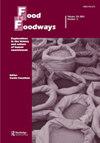“Ready-made” assumptions: Situating convenience as care in the Australian obesity debate
IF 1.1
Q2 ANTHROPOLOGY
引用次数: 6
Abstract
Abstract When it comes to food, eating and technologies, convenience is constructed as contradictory: on the one hand as a practice that saves time and effort, and on the other hand, an easy and often “unhealthy” choice, contributing to obesity rates. Moralizing, classed and gendered discourses around health and obesity mean that convenient options are rarely portrayed as “good choices”. Through ethnographic research on food and families in the suburbs of an Australian city, this paper disrupts negative and polarized constructions of convenience in obesity debates. Building on the work of Mol et al. and Jackson et al. we argue that convenience is shaped by multiple contexts, and in particular, gendered and classed practices of care. In doing so, we suggest that public health interventions that construct convenience foods and technologies as wholly negative miss important cultural contexts in which convenience and care intersect to enhance social relationships.“现成”的假设:在澳大利亚肥胖辩论中,将方便视为护理
摘要当涉及到食物、饮食和技术时,便利性被构造为矛盾的:一方面是一种节省时间和精力的做法,另一方面,它是一种简单且往往“不健康”的选择,导致肥胖率。围绕健康和肥胖的道德化、分类化和性别化话语意味着方便的选择很少被描绘成“好的选择”。通过对澳大利亚城市郊区食物和家庭的民族志研究,本文颠覆了肥胖辩论中负面和两极分化的便利结构。在Mol等人和Jackson等人的工作基础上,我们认为便利性是由多种背景形成的,尤其是性别化和分类化的护理实践。在这样做的过程中,我们认为,将方便食品和技术构建为完全负面的公共卫生干预措施错过了便利和护理交叉以加强社会关系的重要文化背景。
本文章由计算机程序翻译,如有差异,请以英文原文为准。
求助全文
约1分钟内获得全文
求助全文
来源期刊

Food and Foodways
ANTHROPOLOGY-
CiteScore
2.20
自引率
0.00%
发文量
16
期刊介绍:
Food and Foodways is a refereed, interdisciplinary, and international journal devoted to publishing original scholarly articles on the history and culture of human nourishment. By reflecting on the role food plays in human relations, this unique journal explores the powerful but often subtle ways in which food has shaped, and shapes, our lives socially, economically, politically, mentally, nutritionally, and morally. Because food is a pervasive social phenomenon, it cannot be approached by any one discipline. We encourage articles that engage dialogue, debate, and exchange across disciplines.
 求助内容:
求助内容: 应助结果提醒方式:
应助结果提醒方式:


